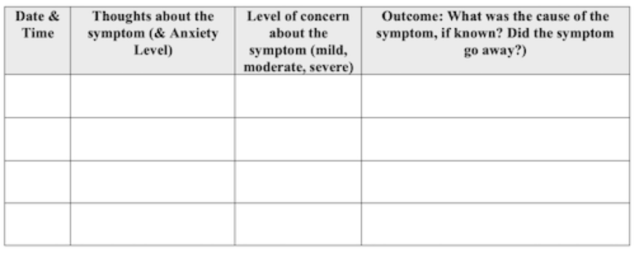Memory biases are one of the cognitive factors that contribute to health anxiety. One type of memory bias responsible for maintaining health anxiety is selective memory. Maybe there was one time or a couple of times that you (or someone you know) were right about a symptom. The symptom was, in fact, due to an actual health concern. Of course, that stands out in your head, right? Those moments are particularly memorable. And now, anytime a new symptom emerges, you think, well, that one time I was right about the symptom, or well, that one time Sally was right about that symptom.
Meanwhile, it is so easy to forget about all of the other times that you had symptoms or bodily sensations, and they were simply due to benign body noise. Those situations just come and go, and we don’t even bother to retain that information. Instead of remembering the countless “body noise” situations, we hyper-focus on the one or two situations when we had a symptom, and it ended up being a real health issue or something serious.
This process actually further reinforces our “threat bias.” In other words, health-anxious people already tend to overestimate the probability and severity of getting a disease. This memory bias further reinforces these beliefs and makes us even more likely to overestimate the probability and severity of serious disease.
This is why it can be really helpful to track your anxious thoughts about your health in a thought record, so you can then look back and see just how often you were correct (or incorrect) about your symptoms and what you thought your symptoms meant. This way, you can keep track of the data and see it all more accurately. I want you to become a scientist and learn to study and analyze your thoughts and outcomes or “data.”
Your Homework
1. The next time you have a symptom, I want you to ask yourself: How many times have I assumed the symptom was due to some serious disease when it was actually just random body noise, anxiety, or a benign or minor health condition?
2. Start tracking your thoughts about your symptoms and their outcomes in the thought record. This will help you to gain some insight into any patterns you have. Namely, the pattern of focusing on the one or more times you did have a serious health issue and ignoring all the times your thoughts about the symptom were wrong. Below is an example of how you can track your symptoms, thoughts, and outcomes. Give it a try. Track all of this for two weeks and then take a look at the data.

Brittney Chesworth
